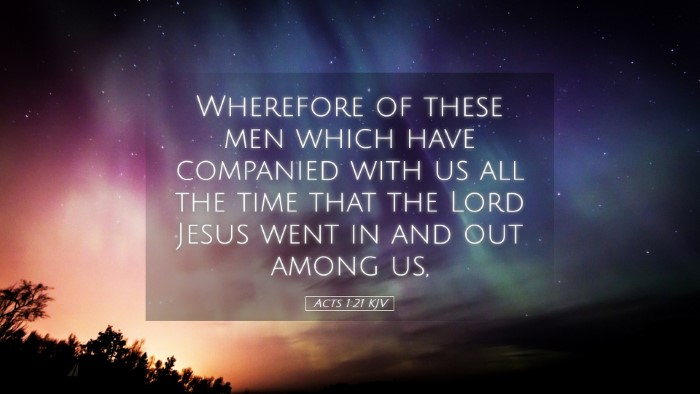Old Testament
Genesis Exodus Leviticus Numbers Deuteronomy Joshua Judges Ruth 1 Samuel 2 Samuel 1 Kings 2 Kings 1 Chronicles 2 Chronicles Ezra Nehemiah Esther Job Psalms Proverbs Ecclesiastes Song of Solomon Isaiah Jeremiah Lamentations Ezekiel Daniel Hosea Joel Amos Obadiah Jonah Micah Nahum Habakkuk Zephaniah Haggai Zechariah MalachiActs 1:21
Acts 1:21 KJV
Wherefore of these men which have companied with us all the time that the Lord Jesus went in and out among us,
Acts 1:21 Bible Commentary
Commentary on Acts 1:21
Acts 1:21 states, "Therefore it is necessary that of the men who have accompanied us during all the time that the Lord Jesus went in and out among us,...” This verse is pivotal as it sets the stage for the selection of a new apostle to replace Judas Iscariot, emphasizing several key themes in the early church's formation and leadership.
Contextual Overview
The broader context of Acts 1 concerns the period following the resurrection of Jesus until His ascension. During this time, the apostles are instructed to wait in Jerusalem for the coming of the Holy Spirit (Acts 1:4). This waiting period is crucial for understanding the early Church’s reliance on divine guidance.
Insights from Public Domain Commentaries
Matthew Henry's Commentary
Matthew Henry provides an in-depth analysis of the leadership dynamics in the early Church. He notes that the apostles recognized the importance of maintaining a complete and functional apostolic body. Henry writes that it was essential for the new apostle to have been a witness to Jesus’s ministry, a criterion that affirms the continuity of the apostolic witness and the authority of their teaching.
- Witness of Jesus: Henry emphasizes that the individual chosen must have been with Jesus from the baptism of John to His ascension, ensuring that the teachings of Jesus remained central to the apostolic mission.
- Community Involvement: He further highlights the importance of the community's involvement in this process, which points to the democratic aspects of church governance, suggesting a model of leadership that engages the collective body of believers.
Albert Barnes' Notes
Albert Barnes examines the requirement for the new apostle to have been with Jesus throughout His ministry. He underscores that the selection process illustrates the seriousness the apostles attached to their mandate. Barnes remarks that this necessity underscores the role of experience and eyewitness testimony as foundational for the faith.
- Importance of Eyewitness Testimony: Barnes stresses the value of first-hand knowledge of Jesus’s teachings and actions. This ensures that the apostles' message remains grounded in historical reality and divine authority.
- Leadership Development: He notes that the apostles were not merely filling a vacancy; they were intentionally cultivating leadership that mirrored the model set forth by Jesus.
Adam Clarke's Commentary
Adam Clarke offers a theological reflection on the necessity of divine appointment in leadership roles. He posits that the apostles' careful selection of a new member underlines a critical principle of divine sovereignty in the church's leadership structure.
- Divine Guidance: Clarke emphasizes the reliance on divine guidance in choosing a leader, foreshadowing the importance of prayer and the Holy Spirit's direction in decision-making within the church.
- Historical Significance: He also notes how this act serves as a historical and theological reflection of God's continuous work among His people, showcasing that God is not only the initiator of the church but also its sustainer through faithful leaders.
Theological Implications
This verse invites a broader reflection on the role of leadership in the church and the spiritual criteria for those who serve in such capacities. The apostles' adherence to the calling and witness of Jesus suggests that contemporary church leaders must embody similar commitments to their faith and community.
- Covenantal Community: Acts 1:21 reminds modern believers of the covenantal nature of the church, where leadership responsibilities are taken seriously and remain intricately connected to the community's spiritual health.
- Authenticity in Witness: The call for authentic witnesses presents an enduring challenge for church leaders today. Just as the apostles were expected to be genuine eyewitnesses to Jesus’s works and teachings, so too are today's leaders called to authenticity in their faith and action.
Conclusion
Acts 1:21 serves as a foundational text for understanding the apostolic succession and governance of the early church. The insights from Matthew Henry, Albert Barnes, and Adam Clarke highlight the importance of community, eyewitness testimony, and divine guidance in leadership selection. These elements are not only integral to the early church but also resonate powerfully with contemporary ecclesiological practices.


